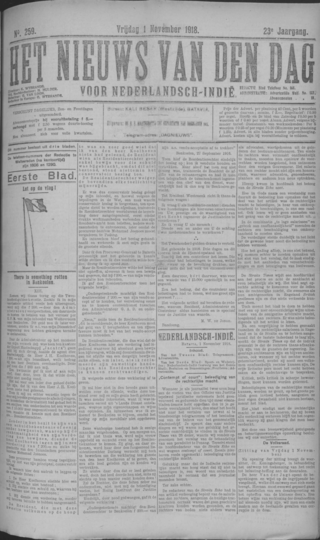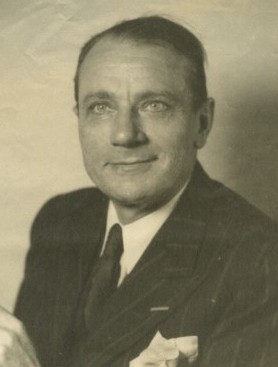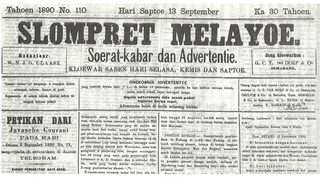Related Research Articles
De Indische Courant was the name of a number of Dutch language newspapers published on the island of Java in the Dutch East Indies.

Het Nieuws van den Dag voor Nederlandsch-Indië was a Dutch-language newspaper published on the island of Java in the Dutch East Indies. Originally called De Indische Courant, it was published in Batavia from 1895 or 1896 to 1900 until it was renamed. One of the paper's contributors was Dutch author and critic of the colonial system Multatuli.

Djawa Tengah was a major Malay-language peranakan Chinese daily newspaper in Semarang, Dutch East Indies from 1909 to 1938. It is said to have been the first Chinese newspaper in Semarang.

Tjahaja Timoer was a Malay-language Peranakan newspaper printed in Malang, Dutch East Indies, from 1907 to 1942.
Parada Harahap was an important journalist and writer from the late colonial period and early independence era in Indonesia. In the 1930s, he was called the "king of the Java press". He pioneered a new kind of politically neutral Malay language newspaper in the 1930s which would cater to the rising middle class of the Indies.

Algemeen handelsblad voor Nederlandsch-Indië was a Dutch language newspaper, published from 1924 to 1942 in Semarang, Dutch East Indies.
Evert Jansen was a newspaper editor, journalist and politician from the Dutch East Indies. From the 1910s to the 1940s, he was editor of a number of major papers including De Locomotief, Bataviaasch Nieuwsblad, Algemeen handelsblad voor Nederlandsch-Indië, and De Indische Courant.
Keng Po was a Malay language Peranakan Chinese newspaper published in Batavia, Dutch East Indies from 1923 to 1958. During most of that time it was the second-most popular Malay-language Chinese newspaper in the Indies after Sin Po. It was also an important paper in the early period of Indonesian independence in the 1950s.

George Antoon Philip Weijer (1891-1979) was a business representative in colonial Indonesia, an economics professor at the University of Utrecht, and a government advisor and company director in the Netherlands.
Warna Warta was a Malay language Peranakan Chinese newspaper published in Semarang, Dutch East Indies from 1902 to 1933. Alongside its more popular rival Djawa Tengah, it was highly influential among the Chinese Indonesian population of Semarang during this time.

Selompret Melajoe was one of the first Malay language newspapers to publish in the Dutch East Indies. It was printed in Semarang, Central Java from 1860 to 1920.
Raden Pandji Wirasmo Notonindito, often referred to as Dr. Notonindito, was a Javanese accountant, intellectual and politician in the Dutch East Indies. He founded the short-lived Indonesian Fascist Party in 1933.
The Indonesian Fascist Party was a short-lived Fascist political party founded in Bandung, Dutch East Indies in the summer of 1933 by a Javanese economist and politician named Notonindito. Although it did not last long and is poorly documented, it is often cited as an example of how European Fascist ideas could manifest themselves in an Asian context, as well as appearing in conspiracy literature exaggerating its importance.

Saadah Alim (1897–1968) was a writer, playwright, translator, journalist and educator in the Dutch East Indies and in Indonesia after independence. She was one of only a handful of Indonesian women authors to be published during the colonial period, alongside Fatimah Hasan Delais, Sariamin Ismail, Soewarsih Djojopoespito and a few others. She is known primarily for her journalism, her collection of short stories Taman Penghibur Hati (1941), and her comedic play Pembalasannya (1940).

Paul Alex Blaauw, usually known as P. A. Blaauw, was an Indo politician, lawyer, and member of the Dutch East Indies Volksraad representing the Indo Europeesch Verbond from the 1920s to the 1940s. During the period of transition to Indonesian independence and the 1949 Dutch–Indonesian Round Table Conference he was a leader of the largest faction advocating for the rights of Indos.

Jong Batak Bond, sometimes simply called Jong Batak, was a short-lived but influential Batak intellectual organization founded in Batavia, Dutch East Indies in December 1925. Like Budi Utomo, Jong Java and other such organizations, its members consisted of native Indonesian students in Dutch-language schools interested in advancing their ethnic group and Indonesian nationalism at the same time. Notable members of the group include Amir Sjarifuddin Harahap, Todung Sutan Gunung Mulia Harahap, Sanusi Pane, Saleh Said Harahap and Arifin Harahap.
Censorship in the Dutch East Indies was significantly stricter than in the Netherlands, as the freedom of the press guaranteed in the Constitution of the Netherlands did not apply in the country's overseas colonies. Before the twentieth century, official censorship focused mainly on Dutch-language materials, aiming at protecting the trade and business interests of the colony and the reputation of colonial officials. In the early twentieth century, with the rise of Indonesian nationalism, censorship also encompassed materials printed in local languages such as Malay and Javanese, and enacted a repressive system of arrests, surveillance and deportations to combat anti-colonial sentiment.

Abdoel Firman Siregar gelar Mangaradja Soangkoepon was a politician and Volksraad member in the Dutch East Indies. He was an Indonesian nationalist and was a political ally of many of the leaders who came to power in the early independence era, although he himself died before the country achieved its independence.

Kho Tjoen Wan, sometimes spelled Kho Tjoen Gwan, was a Chinese Indonesian journalist, writer and political activist active mainly from the 1910s to the 1930s in the Dutch East Indies. He was involved with the Communist Party of Indonesia in the 1920s and may have been its first ethnically Chinese executive member.
Urbanus Pardede was an Indonesian Communist and newspaper editor from Sumatra, active both in the Dutch East Indies and independence eras. During the years 1926–30, Dutch authorities arrested him without charge because of his Communist activities and exiled him to the Boven-Digoel concentration camp. He was also a key figure in the East Sumatra revolution of 1946 and became bupati of Simalungan Regency in the early independence era.
References
- ↑ "Journalistiek". De Indische courant. 15 July 1926.
- ↑ "De "Bintang-Timoer"". Algemeen handelsblad voor Nederlandsch-Indië (in Dutch). July 15, 1926.
- ↑ "Artikel "Saadah Alim"". Ensiklopedia Sastra Indonesia (in Indonesian). Badan Pengembangan dan Pembinaan Bahasa. Kementerian Pendidikan dan Kebudayaan Republik Indonesia. Retrieved 2 June 2021.
- 1 2 "De "Bintang Timoer"". Algemeen handelsblad voor Nederlandsch-Indië (in Dutch). August 4, 1926.
- ↑ "De "Bintang Timoer."". De Indische courant. 6 August 1926.
- ↑ ""Bintang Timur"". Het nieuwsblad voor Sumatra. 20 February 1953.
- ↑ "Bintang Timur". De nieuwsgier. 18 February 1953.
- 1 2 Greg Poulgrain (1998). The Genesis of Konfrontasi: Malaysia, Brunei, Indonesia, 1945-1965. C. Hurst & Co. Publishers. p. 266. ISBN 978-1-85065-513-8.
- 1 2 Political Handbook of the World. McGraw-Hill Book Company. 1959. p. 110.
- ↑ E. Stuart Kirby (1962). Contemporary China. Hong Kong University Press. p. 167.